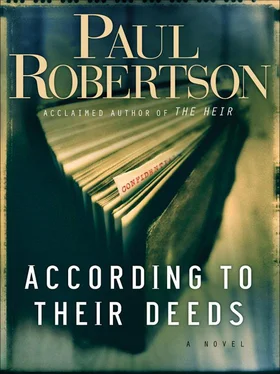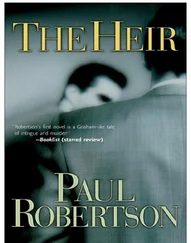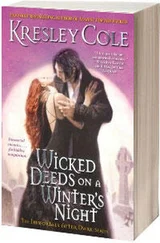Paul Robertson - According to Their Deeds
Здесь есть возможность читать онлайн «Paul Robertson - According to Their Deeds» весь текст электронной книги совершенно бесплатно (целиком полную версию без сокращений). В некоторых случаях можно слушать аудио, скачать через торрент в формате fb2 и присутствует краткое содержание. Жанр: Криминальный детектив, на английском языке. Описание произведения, (предисловие) а так же отзывы посетителей доступны на портале библиотеки ЛибКат.
- Название:According to Their Deeds
- Автор:
- Жанр:
- Год:неизвестен
- ISBN:нет данных
- Рейтинг книги:4 / 5. Голосов: 1
-
Избранное:Добавить в избранное
- Отзывы:
-
Ваша оценка:
- 80
- 1
- 2
- 3
- 4
- 5
According to Their Deeds: краткое содержание, описание и аннотация
Предлагаем к чтению аннотацию, описание, краткое содержание или предисловие (зависит от того, что написал сам автор книги «According to Their Deeds»). Если вы не нашли необходимую информацию о книге — напишите в комментариях, мы постараемся отыскать её.
According to Their Deeds — читать онлайн бесплатно полную книгу (весь текст) целиком
Ниже представлен текст книги, разбитый по страницам. Система сохранения места последней прочитанной страницы, позволяет с удобством читать онлайн бесплатно книгу «According to Their Deeds», без необходимости каждый раз заново искать на чём Вы остановились. Поставьте закладку, и сможете в любой момент перейти на страницу, на которой закончили чтение.
Интервал:
Закладка:
“But we succeeded anyway.”
“It was all you, Charles.”
“I think not. I could never run a business, and you could in your sleep.”
“But there wouldn’t be a reason. It’s my occupation, but it’s your dream.”
“That’s what I do in my sleep. Well, two more books. This one is the hard one.”
She took it anyway. “ A Separate Peace. I wondered what you would have.” She stared at the cover for a while. “I was thinking the other day whether I had regrets.”
“Do you?”
“I would still do it all over again.”
“I would, too,” he said. “My current regret is that I didn’t talk with him more. Have I forgotten? We must have talked over dinner, and about his schoolwork.”
“I’m afraid I mostly remember the arguments,” Dorothy said.
“And compare that to Angelo, who never says anything.”
Dorothy handed the book back. “I am so glad that you brought Angelo into the shop.”
“Does he still remind you of William?”
“Now that I know him, he’s his own person.”
“Do you like Angelo?” Charles asked.
“I do!” Dorothy laughed. “As little as he says, he does have a personality. I don’t know what he would be like if he was more open. I think I’d like him even more.”
“I hope we have a chance to, eventually. Here’s the last book.”
He handed her From Here to Eternity.
Then, for a while, they sat silently and watched the water, while the sun set behind them, firing the far shore orange and red and then leaving it a dark ashen black. The windows of the buildings along it were bright sparks left from the burning; and all around where they were sitting were the bright lanterns of the riverfront and restaurants and streets.
And finally they started for home.
“I looked at the papers this morning.”
The last of a simple dinner was between them on the dining room table.
“Were they bad?” Dorothy asked.
“Yes. Very bad.”
“What?”
“One of them is about Patrick White.”
Charles waited while she worked out what it meant. “About what he did in school?”
“Yes. It isn’t obvious. It’s just a cover page from a University of Virginia honor court. It doesn’t say anything about Mr. White, just a page number, but it’s from a year when he was a student there.”
“It doesn’t have his name?”
“It’s him. I’m sure it is. A person would have to know that the paper was important, and then dig in to find what it meant. But if I were to send that paper to the Washington Post and tell them they could find a scandal behind it, then the damage would be done.”
“But who did send it?”
“Maybe Derek Bastien. Or maybe someone else, but Derek had it. Dorothy, it is obvious to me that Derek was collecting incriminating documents about people.”
“What were the other papers?”
“The checks to Karen Liu; the woman who killed her husband; the page from the University of Virginia; then there’s the list of letters and numbers and dates, and a short article about police in Fairfax breaking up a drug gang.”
“But you don’t know what those are about.”
“No, I don’t. And there’s one more. A copy of a court order releasing eight men from a prison in Kansas, from twenty years ago.” He sighed. “I had Morgan look it up, and the men were released because the prosecutor at their trials had done something wrong.”
“By mistake?”
“Apparently not. And it doesn’t say who the prosecutor was, but John Borchard mentioned to me that he had been a prosecutor in Kansas long ago.”
“That seems obvious,” Dorothy said.
“It seems.”
“It’s difficult, isn’t it?”
“Very difficult,” Charles said. “Who would want to have a list of other people’s sins?”
“Do you mean that literally?”
“I meant it rhetorically. But there is a literal answer in this case, isn’t there?”
“I wish you could give it all to someone else,” Dorothy said. “But I understand why you don’t want to.”
“When I looked at those papers this morning,” Charles said, “I felt like a burden was coming down on my shoulders.”
He stood from the table and carried his plate to the kitchen. Dorothy followed.
“How can you decide what to do?”
“I want to find out about Derek and why he had the papers, but I’ll still have to decide what to do with them. I want to know the people themselves.”
“But even then, what would you do?”
“I wonder…”
“What?”
“If there will be anything I can do to help them.”
“I’ve been reading a volume of Jeremy Bentham’s correspondence.”
“I haven’t sold you one, Derek.”
“Ha! No, Charles, this is a modern version. But he certainly believed that people are controllable by innate laws.”
“And his prison reforms prove him wrong. He was also firmly against the idea of innate, inalienable human rights.”
“ ‘Nonsense on stilts.’ ”
“Exactly. Locke would not have been proud of him as a disciple. I wonder that you’re wasting your time, Derek.”
“I like to be provoked, Charles. He was voted an honorary citizen of the French Revolution.”
“Not the best character reference.”
“I am interested in his ideas of punishment. If someone commits a crime, why do we punish him by taking months or years of his life? You’ve stolen a loaf of bread, we seize ten years. What does it accomplish?”
“It is a deterrent threat.”
“But for the one who isn’t deterred?”
“I suppose it prevents them from stealing another loaf, at least for the next ten years. And, Derek, time is one thing everyone has. They might not have money for you to take from them, but they do have time.”
“Bentham said that prison should be for correcting the individual, not punishing them. The Enlightenment had found its way into prison.”
“I don’t think he knew how to correct a person.”
“If you had to decide a person’s punishment, Charles, how would you do it?”
“I don’t think a person can be corrected, Derek. I think he can only be redeemed.”
SATURDAY MORNING
Charles wandered down the stairs to the showroom. Dorothy was behind the counter talking with a middle-aged, upper-class lady with a large middle and larger upper.
“Mrs. Stratton,” he said. “Good morning.”
“Good morning, Mr. Beale,” the woman said in a properly fruity voice. “Dorothy and I are discussing the banquet this evening.”
“We’re looking forward to it.”
The front door opened.
“Good morning,” Dorothy said in a bright greet-the-customer voice, and Charles turned to look toward the door, and then down slightly.
“Congresswoman Liu! What an honor!”
“Good morning, Mr. Beale.” She nodded toward the ladies at the counter. “Good morning!”
“Dorothy!” Charles said. “Roll out the red carpet. This is her! An honest-to-goodness congresswoman!”
“Oh, Mr. Beale. Please!” Karen Liu beamed her searchlight-strength smile and without any hint of embarrassment. “Thank you!”
“This is my wife, Dorothy.”
“Good morning, Mrs. Beale!”
“And our dear friend, Mrs. Wilhelmina Stratton.”
“A congresswoman?” Mrs. Stratton said. “How do you do!”
A few tangled moments passed, of ebullient greetings and fulsome praises and self-effacing protestations, and of Mrs. Stratton seizing opportunity with both hands. But finally the air cleared and extraneous personalities realized they were no longer needed. Only Charles, Dorothy and the fully introduced congresswoman were left.
“And what an interesting shop!” she said as she finally had a chance to see it.
Читать дальшеИнтервал:
Закладка:
Похожие книги на «According to Their Deeds»
Представляем Вашему вниманию похожие книги на «According to Their Deeds» списком для выбора. Мы отобрали схожую по названию и смыслу литературу в надежде предоставить читателям больше вариантов отыскать новые, интересные, ещё непрочитанные произведения.
Обсуждение, отзывы о книге «According to Their Deeds» и просто собственные мнения читателей. Оставьте ваши комментарии, напишите, что Вы думаете о произведении, его смысле или главных героях. Укажите что конкретно понравилось, а что нет, и почему Вы так считаете.











